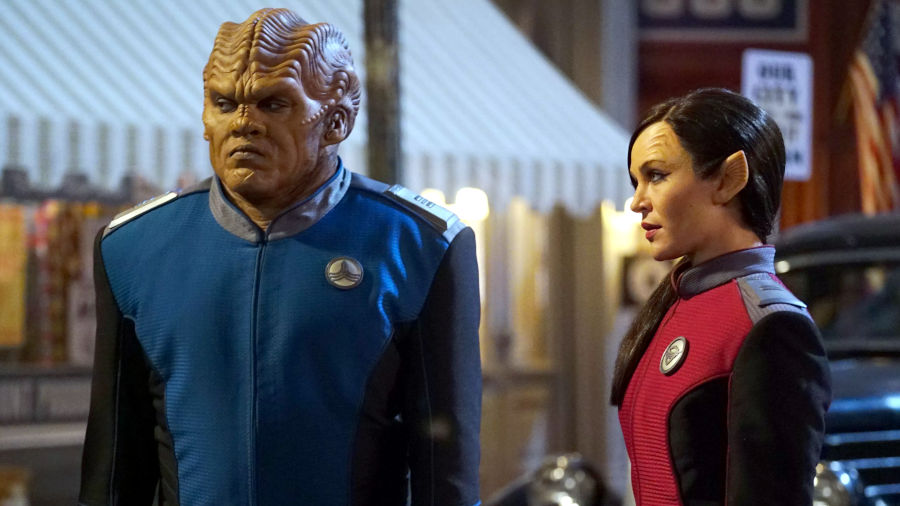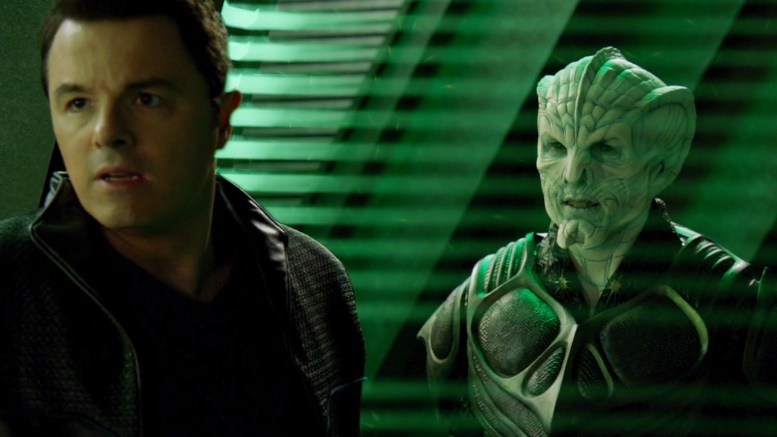Article Content
Meet the Kaylon

"Identity, Part 1" is the best and most involving episode of The Orville so far. That it holds that distinction and still is not enough to be called "great" (at least in my book) is perhaps a problem, but this series is still young and it occupies an admittedly odd space.
The Orville is generally too cavalier to be considered serious, yet too serious to embrace the idea of a true satire/spoof. It loves Trek far too much to lampoon it. So it occupies the land of a seriocomic homage, which can make its universe hard to accept on straightforward dramatic terms. That fact must be confronted here, where an existential threat comes off more like a really cool cinematic concept than something we truly believe.
The trouble with Moclans

The most important dialogue in "Deflectors" comes near the end. "You know, the more I learn about the Moclans, the more I see that our differences go right to the core of our values," Ed says to Kelly. "How long can an alliance with a culture like that last?" It’s a good question, one that helps acknowledge a disconcerting pattern that’s been going on here across multiple episodes.
This is no less than the third episode of this series to detail Moclan culture as having some highly questionable qualities — forced gender reassignment in "About a Girl," divorce by murder in "Primal Urges," and now harsh prejudicial judgment for sexual preferences as seen here. A trend has emerged regarding the Moclans, and it’s not so hunky-dory. So this must be going somewhere, right?
I hope so, because something ominous seems to be building, and stands in stark contrast to the use of Bortus’ Moclan deadpan to provide the series’ best comic delivery.
See you on the other side

“Saints of Imperfection” is Discovery‘s heaviest venture into technobabble disaster plotting to date. That this episode is fairly focused, well-paced, involving, and has some solid moments of emotion makes it easier to look past some of the dopier and/or insane things happening here.
But the episode’s big reveal would’ve landed better if the series’ creators and actors weren’t so good at spoiling their own show in the press. I’ve known for months that Dr. Culber would be returning from the dead at some point this season. Part of that is my own fault for reading any headline about this show when I should know full well the creators will give plot points away if it means promoting their show. But then they also put Wilson Cruz’s name in the opening credits at the beginning of the hour, so by the time we get to the reveal that the “monster” terrorizing the mycelium network is actually Culber — who has been trapped there since he was killed by Voq/Ash last season — we have already figured it out.
An obol for classic Trek fans

“An Obol for Charon” is perhaps the most classic take on classic Trek yet from Discovery. After last week’s “Point of Light” seemed to go in about 15 directions at once in its pursuit of various serial subplots, “Obol” is very disciplined in focusing on the exploration aspects of Trek within the confines of a ship-in-peril premise and a tighter — if familiar — plot and structure. The result is a very solid outing, particularly with its late revelations, but one that is somewhat held back by some quirks in execution.
Checking in with L’Rell, Ash, Klingons, Section 31, Spock’s mom…

After the first two episodes of season two seemed to serve as a sort of re-calibration of this series to be a little more contemplative and a little less frenetic, we now get “Point of Light,” which serves as the un-re-calibration and feels like a structural throwback to season one. This is a rushed, overly busy episode featuring no fewer than four plotlines, executed at variable levels of pacing and interest. In some cases, the goal appears to have been to quickly move characters from point A to B at absolutely all costs. In other cases, we seem to be on a stationary bike. In no cases is this absorbing storytelling like in “Brother” or “New Eden,” because it’s just too much spread too thin. It’s more along the lines of: Well, all that just happened. Tune in next week to see where all this is maybe going!
The awesome power of #BortusStache

Go big or go home.
That’s the takeaway from “A Happy Refrain,” in which Seth MacFarlane puts his money (well, Fox’s money) and heart all-in on an hour of fanciful whimsy that will come off as either hugely affectionate or hugely self-indulgent, depending on your level of cynicism. Maybe both. Put me in the “both” camp.
I respect MacFarlane for having the guts to go so far out there and clearly dig so deep into his well of personal obsessions and put them out on the screen for everyone to see, even though this is the very opposite of cool. MacFarlane is clearly a hopeless romantic who believes in big, grand gestures as much as he believes in sophomoric jokes. The question to be answered is whether the concept can work within the confines of these characters. It tries very hard, and it comes close, but it ultimately falls short.
Exploration, discovery reveal ‘New Eden’

If there’s a trend to note two episodes into season two of Discovery, it’s the more low-key approach. Rather than the frequent hey-look-at-me twists, turns, and sometimes-abrasive hyperbole of season one, these first two episodes take a more measured approach of contemplation and slow-burn plotting. That’s not to say there aren’t flashy moments of kineticism (exhibit one: the asteroid sequence of last week; exhibit two: more fun with asteroids here), but the story seems to be more intent on exploring a gradual sci-fi mystery while foregrounding a weekly plot that grows from it.
Worst. Birthday. Ever.

“All the World Is Birthday Cake,” possibly more than any Orville episode so far, raises serious questions about what this series is trying to do and what the rules of this universe are. This is an episode that has an underlying concept that could really only have worked on TOS — where the rules of engagement did not yet exist for the audience. Meanwhile, it’s got the story beats and filming style of TNG — minus all the violence, anyway. And then it has all the problems we associate with Voyager and Enterprise — pointless action and hard-headed aliens holding ridiculously absolute beliefs. The end result is the most heavy-handed episode of this series to date.
Neither ‘Fishes’ nor fowl

The biggest problem at the core of "Nothing Left on Earth Excepting Fishes" is that I just can’t bring myself to care about Ed Mercer’s poor broken heart, and the episode really, really wants me to. The second-biggest problem is this episode recycles so many over-worn tropes that I grew restless and bored with stretches of it.
Then there’s the ending, which tries with all its might to be simultaneously offbeat and poignant (as a shuttle flies off to Billy Joel), but falls flat because such pretentions only work if there’s a workable emotional core beneath the surface. There isn’t here, so it feels like an audacious but empty artistic conceit. I’ll give Seth and his crew an A for effort, but a C for the end result.
O ‘Brother,’ where art thou?

"Brother" is a not-riveting but very solid episode of Discovery that feels the most like pre-Discovery Star Trek since "The Vulcan Hello" (minus the Klingons and all their subtitles). Untethered from Secret Evil Mirror Captain Lorca and the less-than-coherent war with the Klingons, the series is free to turn out an episode that has the story beats of previous Trek series, except with better production values.
About those production values: Above all else, that’s what sets Discovery apart from previous Trek series. I have no idea what TNG or DS9 would’ve looked like if it were made with today’s technology and digital artists, but Discovery looks amazing. The level of detail in the visual effects and production design are of movie caliber. I know I’ve said that before, but it bears repeating. Meanwhile, the cinematography (particularly in Burnham’s dreamlike flashback sequences) is so artistically polished that it borders on excessive.
